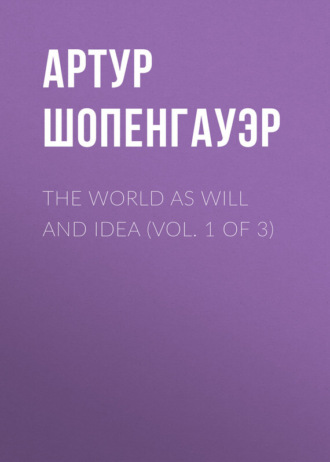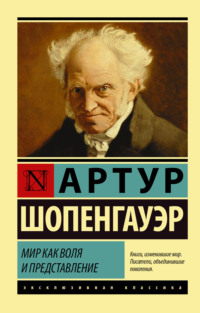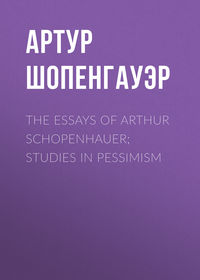 полная версия
полная версияThe World as Will and Idea (Vol. 1 of 3)
Eternal justice withdraws itself from the vision that is involved in the knowledge which follows the principle of sufficient reason in the principium individuationis; such vision misses it altogether unless it vindicates it in some way by fictions. It sees the bad, after misdeeds and cruelties of every kind, live in happiness and leave the world unpunished. It sees the oppressed drag out a life full of suffering to the end without an avenger, a requiter appearing. But that man only will grasp and comprehend eternal justice who raises himself above the knowledge that proceeds under the guidance of the principle of sufficient reason, bound to the particular thing, and recognises the Ideas, sees through the principium individuationis, and becomes conscious that the forms of the phenomenon do not apply to the thing-in-itself. Moreover, he alone, by virtue of the same knowledge, can understand the true nature of virtue, as it will soon disclose itself to us in connection with the present inquiry, although for the practice of virtue this knowledge in the abstract is by no means demanded. Thus it becomes clear to whoever has attained to the knowledge referred to, that because the will is the in-itself of all phenomena, the misery which is awarded to others and that which he experiences himself, the bad and the evil, always concerns only that one inner being which is everywhere the same, although the phenomena in which the one and the other exhibits itself exist as quite different individuals, and are widely separated by time and space. He sees that the difference between him who inflicts the suffering and him who must bear it is only the phenomenon, and does not concern the thing-in-itself, for this is the will living in both, which here, deceived by the knowledge which is bound to its service, does not recognise itself, and seeking an increased happiness in one of its phenomena, produces great suffering in another, and thus, in the pressure of excitement, buries its teeth in its own flesh, not knowing that it always injures only itself, revealing in this form, through the medium of individuality, the conflict with itself which it bears in its inner nature. The inflicter of suffering and the sufferer are one. The former errs in that he believes he is not a partaker in the suffering; the latter, in that he believes he is not a partaker in the guilt. If the eyes of both were opened, the inflicter of suffering would see that he lives in all that suffers pain in the wide world, and which, if endowed with reason, in vain asks why it was called into existence for such great suffering, its desert of which it does not understand. And the sufferer would see that all the wickedness which is or ever was committed in the world proceeds from that will which constitutes his own nature also, appears also in him, and that through this phenomenon and its assertion he has taken upon himself all the sufferings which proceed from such a will and bears them as his due, so long as he is this will. From this knowledge speaks the profound poet Calderon in “Life a Dream” —
“Pues el delito mayorDel hombre es haber nacido.”(“For the greatest crime of manIs that he ever was born.”)Why should it not be a crime, since, according to an eternal law, death follows upon it? Calderon has merely expressed in these lines the Christian dogma of original sin.
The living knowledge of eternal justice, of the balance that inseparably binds together the malum culpæ with the malum pœnæ, demands the complete transcending of individuality and the principle of its possibility. Therefore it will always remain unattainable to the majority of men, as will also be the case with the pure and distinct knowledge of the nature of all virtue, which is akin to it, and which we are about to explain. Accordingly the wise ancestors of the Hindu people have directly expressed it in the Vedas, which are only allowed to the three regenerate castes, or in their esoteric teaching, so far at any rate as conception and language comprehend it, and their method of exposition, which always remains pictorial and even rhapsodical, admits; but in the religion of the people, or exoteric teaching, they only communicate it by means of myths. The direct exposition we find in the Vedas, the fruit of the highest human knowledge and wisdom, the kernel of which has at last reached us in the Upanishads as the greatest gift of this century. It is expressed in various ways, but especially by making all the beings in the world, living and lifeless, pass successively before the view of the student, and pronouncing over every one of them that word which has become a formula, and as such has been called the Mahavakya: Tatoumes, – more correctly, Tat twam asi, – which means, “This thou art.”78 But for the people, that great truth, so far as in their limited condition they could comprehend it, was translated into the form of knowledge which follows the principle of sufficient reason. This form of knowledge is indeed, from its nature, quite incapable of apprehending that truth pure and in itself, and even stands in contradiction to it, yet in the form of a myth it received a substitute for it which was sufficient as a guide for conduct. For the myth enables the method of knowledge, in accordance with the principle of sufficient reason, to comprehend by figurative representation the ethical significance of conduct, which itself is ever foreign to it. This is the aim of all systems of religion, for as a whole they are the mythical clothing of the truth which is unattainable to the uncultured human intellect. In this sense this myth might, in Kant's language, be called a postulate of the practical reason; but regarded as such, it has the great advantage that it contains absolutely no elements but such as lie before our eyes in the course of actual experience, and can therefore support all its conceptions with perceptions. What is here referred to is the myth of the transmigration of souls. It teaches that all sufferings which in life one inflicts upon other beings must be expiated in a subsequent life in this world, through precisely the same sufferings; and this extends so far, that he who only kills a brute must, some time in endless time, be born as the same kind of brute and suffer the same death. It teaches that wicked conduct involves a future life in this world in suffering and despised creatures, and, accordingly, that one will then be born again in lower castes, or as a woman, or as a brute, as Pariah or Tschandala, as a leper, or as a crocodile, and so forth. All the pains which the myth threatens it supports with perceptions from actual life, through suffering creatures which do not know how they have merited their misery, and it does not require to call in the assistance of any other hell. As a reward, on the other hand, it promises re-birth in better, nobler forms, as Brahmans, wise men, or saints. The highest reward, which awaits the noblest deeds and the completest resignation, which is also given to the woman who in seven successive lives has voluntarily died on the funeral pile of her husband, and not less to the man whose pure mouth has never uttered a single lie, – this reward the myth can only express negatively in the language of this world by the promise, which is so often repeated, that they shall never be born again, Non adsumes iterum existentiam apparentem; or, as the Buddhists, who recognise neither Vedas nor castes, express it, “Thou shalt attain to Nirvâna,” i. e., to a state in which four things no longer exist – birth, age, sickness, and death.
Never has a myth entered, and never will one enter, more closely into the philosophical truth which is attainable to so few than this primitive doctrine of the noblest and most ancient nation. Broken up as this nation now is into many parts, this myth yet reigns as the universal belief of the people, and has the most decided influence upon life to-day, as four thousand years ago. Therefore Pythagoras and Plato have seized with admiration on that ne plus ultra of mythical representation, received it from India or Egypt, honoured it, made use of it, and, we know not how far, even believed it. We, on the contrary, now send the Brahmans English clergymen and evangelical linen-weavers to set them right out of sympathy, and to show them that they are created out of nothing, and ought thankfully to rejoice in the fact. But it is just the same as if we fired a bullet against a cliff. In India our religions will never take root. The ancient wisdom of the human race will not be displaced by what happened in Galilee. On the contrary, Indian philosophy streams back to Europe, and will produce a fundamental change in our knowledge and thought.
§ 64. From our exposition of eternal justice, which is not mythical but philosophical, we will now proceed to the kindred investigation of the ethical significance of conduct and of conscience, which is the merely felt knowledge of that significance. But first I wish at this point to draw attention to two peculiarities of human nature, that might help to make clear how the nature of that eternal justice, and the unity and identity of the will in all its phenomena upon which it rests, is known to every one, at least as an obscure feeling.
When a bad deed has been done, it affords satisfaction not only to the sufferer, who for the most part feels the desire of revenge, but also to the perfectly indifferent spectator, to see that he who caused another pain suffers himself a like measure of pain; and this quite independently of the end which we have shown the state has in view in punishment, and which is the foundation of penal law. It seems to me that what expresses itself here is nothing but the consciousness of that eternal justice, which is, nevertheless, at once misunderstood and falsified by the unenlightened mind, for, involved in the principium individuationis, it produces an amphiboly of the concepts and demands from the phenomenon what only belongs to the thing in itself. It does not see how far in themselves the offender and the offended are one, and that it is the same being which, not recognising itself in its own manifestation, bears both the pain and the guilt, but it desires rather to see the pain also in the particular individual to whom the guilt belongs. Therefore, most persons would demand that a man who had a very high degree of wickedness which might yet occur in many others, only not matched with other qualities such as are found in him, a man who also far surpassed others by extraordinary intellectual powers, and who inflicted unspeakable sufferings upon millions of others – for example, as a conqueror, – most persons, I say, would demand that such a man should at some time and in some place expiate all these sufferings by a like amount of pain; for they do not recognise how in themselves the inflicter of suffering and the sufferers are one, and that it is the same will through which the latter exist and live which also appears in the former, and just through him attains to a distinct revelation of its nature, and which likewise suffers both in the oppressed and the oppressor; and indeed in the latter in a greater measure, as the consciousness has attained a higher degree of clearness and distinctness and the will has greater vehemence. But that the deeper knowledge, which is no longer involved in the principium individuationis, from which all virtue and nobleness proceed, no longer retains the disposition which demands requital, is shown by the Christian ethics, which absolutely forbids all requital of evil with evil, and allows eternal justice to proceed in the sphere of the thing-in-itself, which is different from that of the phenomenon. (“Vengeance is mine; I will repay, saith the Lord,” – Rom. xii. 19.)
A much more striking, but also a much rarer, characteristic of human nature, which expresses that desire to draw eternal justice into the province of experience, i. e., of individuality, and at the same time indicates a felt consciousness that, as I have expressed it above, the will to live conducts at its own cost the great tragedy and comedy, and that the same one will lives in all manifestations, – such a characteristic, I say, is the following. We sometimes see a man so deeply moved by a great injury which he has experienced, or, it may be, only witnessed, that he deliberately and irretrievably stakes his own life in order to take vengeance on the perpetrator of that wrong. We see him seek for some mighty oppressor through long years, murder him at last, and then himself die on the scaffold, as he had foreseen, and often, it may be, did not seek to avoid, for his life had value for him only as a means of vengeance. We find examples of this especially among the Spaniards.79 If, now, we consider the spirit of that desire for retribution carefully, we find that it is very different from common revenge, which seeks to mitigate the suffering, endured by the sight of the suffering inflicted; indeed, we find that what it aims at deserves to be called, not so much revenge as punishment. For in it there really lies the intention of an effect upon the future through the example, and that without any selfish aim, either for the avenging person, for it costs him his life, or for a society which secures its own safety by laws. For that punishment is carried out by individuals, not by the state, nor is it in fulfilment of a law, but, on the contrary, always concerns a deed which the state either would not or could not punish, and the punishment of which it condemns. It seems to me that the indignation which carries such a man so far beyond the limits of all self-love springs from the deepest consciousness that he himself is the whole will to live, which appears in all beings through all time, and that therefore the most distant future belongs to him just as the present, and cannot be indifferent to him. Asserting this will, he yet desires that in the drama which represents its nature no such fearful wrong shall ever appear again, and wishes to frighten ever future wrong-doer by the example of a vengeance against which there is no means of defence, since the avenger is not deterred by the fear of death. The will to live, though still asserting itself, does not here depend any longer upon the particular phenomenon, the individual, but comprehends the Idea of man, and wishes to keep its manifestation pure from such a fearful and shocking wrong. It is a rare, very significant, and even sublime trait of character through which the individual sacrifices himself by striving to make himself the arm of eternal justice, of the true nature of which he is yet ignorant.
§ 65. In all the preceding investigations of human action, we have been leading up to the final investigation, and have to a considerable extent lightened the task of raising to abstract and philosophical clearness, and exhibiting as a branch of our central thought that special ethical significance of action which in life is with perfect understanding denoted by the words good and bad.
First, however, I wish to trace back to their real meaning those conceptions of good and bad which have been treated by the philosophical writers of the day, very extraordinarily, as simple conceptions, and thus incapable of analysis; so that the reader may not remain involved in the senseless delusion that they contain more than is actually the case, and express in and for themselves all that is here necessary. I am in a position to do this because in ethics I am no more disposed to take refuge behind the word good than formerly behind the words beautiful and true, in order that by the adding a “ness,” which at the present day is supposed to have a special σεμνοτης, and therefore to be of assistance in various cases, and by assuming an air of solemnity, I might induce the belief that by uttering three such words I had done more than denote three very wide and abstract, and consequently empty conceptions, of very different origin and significance. Who is there, indeed, who has made himself acquainted with the books of our own day to whom these three words, admirable as are the things to which they originally refer, have not become an aversion after he has seen for the thousandth time how those who are least capable of thinking believe that they have only to utter these three words with open mouth and the air of an intelligent sheep, in order to have spoken the greatest wisdom?
The explanation of the concept true has already been given in the essay on the principle of sufficient reason, chap. v. § 29 et seq. The content of the concept beautiful found for the first time its proper explanation through the whole of the Third Book of the present work. We now wish to discover the significance of the concept good, which can be done with very little trouble. This concept is essentially relative, and signifies the conformity of an object to any definite effort of the will. Accordingly everything that corresponds to the will in any of its expressions and fulfils its end is thought through the concept good, however different such things may be in other respects. Thus we speak of good eating, good roads, good weather, good weapons, good omens, and so on; in short, we call everything good that is just as we wish it to be; and therefore that may be good in the eyes of one man which is just the reverse in those of another. The conception of the good divides itself into two sub-species – that of the direct and present satisfaction of any volition, and that of its indirect satisfaction which has reference to the future, i. e., the agreeable and the useful. The conception of the opposite, so long as we are speaking of unconscious existence, is expressed by the word bad, more rarely and abstractly by the word evil, which thus denotes everything that does not correspond to any effort of the will. Like all other things that can come into relation to the will, men who are favourable to the ends which happen to be desired, who further and befriend them, are called good, in the same sense, and always with that relative limitation, which shows itself, for example, in the expression, “I find this good, but you don't.” Those, however, who are naturally disposed not to hinder the endeavours of others, but rather to assist them, and who are thus consistently helpful, benevolent, friendly, and charitable, are called good men, on account of this relation of their conduct to the will of others in general. In the case of conscious beings (brutes and men) the contrary conception is denoted in German, and, within the last hundred years or so, in French also, by a different word from that which is used in speaking of unconscious existence; in German, böse; in French, méchant; while in almost all other languages this distinction does not exist; and κακος, malus, cattivo, bad, are used of men, as of lifeless things, which are opposed to the ends of a definite individual will. Thus, having started entirely from the passive element in the good, the inquiry could only proceed later to the active element, and investigate the conduct of the man who is called good, no longer with reference to others, but to himself; specially setting itself the task of explaining both the purely objective respect which such conduct produces in others, and the peculiar contentment with himself which it clearly produces in the man himself, since he purchases it with sacrifices of another kind; and also, on the other hand, the inner pain which accompanies the bad disposition, whatever outward advantages it brings to him who entertains it. It was from this source that the ethical systems, both the philosophical and those which are supported by systems of religion, took their rise. Both seek constantly in some way or other to connect happiness with virtue, the former either by means of the principle of contradiction or that of sufficient reason, and thus to make happiness either identical with or the consequence of virtue, always sophistically; the latter, by asserting the existence of other worlds than that which alone can be known to experience.80 In our system, on the contrary, virtue will show itself, not as a striving after happiness, that is, well-being and life, but as an effort in quite an opposite direction.
It follows from what has been said above, that the good is, according to its concept, των πρως τι; thus every good is essentially relative, for its being consists in its relation to a desiring will. Absolute good is, therefore, a contradiction in terms; highest good, summum bonum, really signifies the same thing – a final satisfaction of the will, after which no new desire could arise, – a last motive, the attainment of which would afford enduring satisfaction of the will. But, according to the investigations which have already been conducted in this Fourth Book, such a consummation is not even thinkable. The will can just as little cease from willing altogether on account of some particular satisfaction, as time can end or begin; for it there is no such thing as a permanent fulfilment which shall completely and for ever satisfy its craving. It is the vessel of the Danaides; for it there is no highest good, no absolute good, but always a merely temporary good. If, however, we wish to give an honorary position, as it were emeritus, to an old expression, which from custom we do not like to discard altogether, we may, metaphorically and figuratively, call the complete self-effacement and denial of the will, the true absence of will, which alone for ever stills and silences its struggle, alone gives that contentment which can never again be disturbed, alone redeems the world, and which we shall now soon consider at the close of our whole investigation – the absolute good, the summum bonum– and regard it as the only radical cure of the disease of which all other means are only palliations or anodynes. In this sense the Greek τελος and also finis bonorum correspond to the thing still better. So much for the words good and bad; now for the thing itself.
If a man is always disposed to do wrong whenever the opportunity presents itself, and there is no external power to restrain him, we call him bad. According to our doctrine of wrong, this means that such a man does not merely assert the will to live as it appears in his own body, but in this assertion goes so far that he denies the will which appears in other individuals. This is shown by the fact that he desires their powers for the service of his own will, and seeks to destroy their existence when they stand in the way of its efforts. The ultimate source of this is a high degree of egoism, the nature of which has been already explained. Two things are here apparent. In the first place, that in such a man an excessively vehement will to live expresses itself, extending far beyond the assertion of his own body; and, in the second place, that his knowledge, entirely given up to the principle of sufficient reason and involved in the principium individuationis, cannot get beyond the difference which this latter principle establishes between his own person and every one else. Therefore he seeks his own well-being alone, completely indifferent to that of all others, whose existence is to him altogether foreign and divided from his own by a wide gulf, and who are indeed regarded by him as mere masks with no reality behind them. And these two qualities are the constituent elements of the bad character.
This great intensity of will is in itself and directly a constant source of suffering. In the first place, because all volition as such arises from want; that is, suffering. (Therefore, as will be remembered, from the Third Book, the momentary cessation of all volition, which takes place whenever we give ourselves up to æsthetic contemplation, as pure will-less subject of knowledge, the correlative of the Idea, is one of the principal elements in our pleasure in the beautiful.) Secondly, because, through the causal connection of things, most of our desires must remain unfulfilled, and the will is oftener crossed than satisfied, and therefore much intense volition carries with it much intense suffering. For all suffering is simply unfulfilled and crossed volition; and even the pain of the body when it is injured or destroyed is as such only possible through the fact that the body is nothing but the will itself become object. Now on this account, because much intense suffering is inseparable from much intense volition, very bad men bear the stamp of inward suffering in the very expression of the countenance; even when they have attained every external happiness, they always look unhappy so long as they are not transported by some momentary ecstasy and are not dissembling. From this inward torment, which is absolutely and directly essential to them, there finally proceeds that delight in the suffering of others which does not spring from mere egoism, but is disinterested, and which constitutes wickedness proper, rising to the pitch of cruelty. For this the suffering of others is not a means for the attainment of the ends of its own will, but an end in itself. The more definite explanation of this phenomenon is as follows: – Since man is a manifestation of will illuminated by the clearest knowledge, he is always contrasting the actual and felt satisfaction of his will with the merely possible satisfaction of it which knowledge presents to him. Hence arises envy: every privation is infinitely increased by the enjoyment of others, and relieved by the knowledge that others also suffer the same privation. Those ills which are common to all and inseparable from human life trouble us little, just as those which belong to the climate, to the whole country. The recollection of greater sufferings than our own stills our pain; the sight of the sufferings of others soothes our own. If, now, a man is filled with an exceptionally intense pressure of will, – if with burning eagerness he seeks to accumulate everything to slake the thirst of his egoism, and thus experiences, as he inevitably must, that all satisfaction is merely apparent, that the attained end never fulfils the promise of the desired object, the final appeasing of the fierce pressure of will, but that when fulfilled the wish only changes its form, and now torments him in a new one; and indeed that if at last all wishes are exhausted, the pressure of will itself remains without any conscious motive, and makes itself known to him with fearful pain as a feeling of terrible desolation and emptiness; if from all this, which in the case of the ordinary degrees of volition is only felt in a small measure, and only produces the ordinary degree of melancholy, in the case of him who is a manifestation of will reaching the point of extraordinary wickedness, there necessarily springs an excessive inward misery, an eternal unrest, an incurable pain; he seeks indirectly the alleviation which directly is denied him, – seeks to mitigate his own suffering by the sight of the suffering of others, which at the same time he recognises as an expression of his power. The suffering of others now becomes for him an end in itself, and is a spectacle in which he delights; and thus arises the phenomenon of pure cruelty, blood-thirstiness, which history exhibits so often in the Neros and Domitians, in the African Deis, in Robespierre, and the like.









